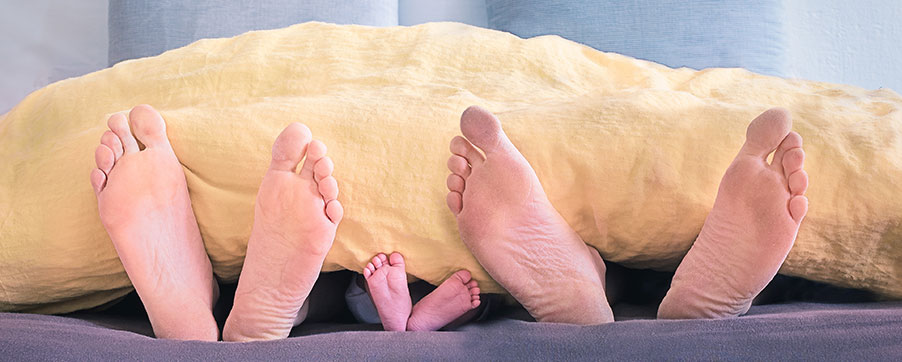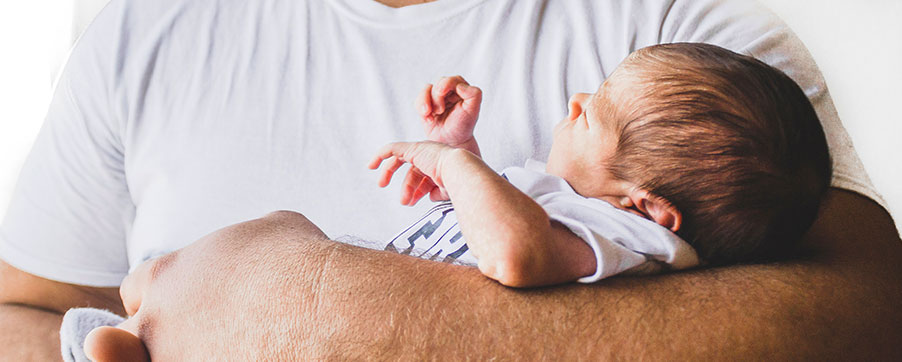There's hardly any subject that's been the subject of so many myths as sleep. What is good for your baby, what is right? And which expectations are realistic? Here, baby sleep expert Anna Recklies cleans up with old wives' tales and myths about baby sleep.
"So?! Is she sleeping through yet?"
As a baby sleep consultant, I often come across myths about baby sleep when talking to parents. The most important word seems to be "sleep through." If you meet friends or people you know, after a very short time the classic question comes up: "So? Is she sleeping through yet?" In fact, this question can be answered in the affirmative more often than one might expect. For us adults, sleeping through means sleeping through the night. We apply this notion to the sleep patterns of our children. Babies need more sleep, so you might imagine 10-12 hours of sleep.


The 5 hour rule
But sleep experts and scientists have a different opinion. For them, "sleeping through" means sleeping for five hours at a time. Short waking phases are allowed if children fall asleep again immediately. If the baby sleeps from midnight to 5 o'clock in the morning and is possibly briefly breastfed in between, has assured itself of your presence or would like to be only rocked in the NONOMO® for example, your baby successfully sleeps through!
Anyway, there is only one answer to the question of whether the child is already sleeping through: "Yes!"
Sleep expectations
Another topic that I very often encounter in sleep consultation is sleep expectation. What do we actually expect from our babies? How, where and how long should they sleep?
Surveys have shown that especially people in the western world have the expectation that a child, even at the age of only a few months, firstly sleeps all night and secondly also sleeps alone in their room, furnished with so much love, in their new baby bed.


Worldwide differences
Common expectations sometimes differ widely in international comparison, as the following examples show: Parents from Costa Rica take a much more relaxed approach to the subject. There, children are expected to sleep through the night at around 3.5 years of age. Indian parents even expect this only when the children are almost 5 years old. When asked when children are able to sleep alone, parents from Cameroon assume that they will sleep through the night at around 5 years of age. In Costa Rica, children are expected to have acquired the ability to sleep alone by the age of 6.
The easiest way is to say goodbye to your expectations and to accompany your child in its needs. There may be children who can sleep alone at the age of a few months. Maybe they would also benefit from a shared sleeping setting, but at least they do not demand it. Such children do exist. Many children demand their need for sleeping together and each family can find its own solution that suits all concerned. A good possibility is, for example, to bed the baby next to the parents' bed in a NONOMO Swinging Hammock. The rocking movement suggests that the baby is carried and held, the spine can be rounded and mum and dad are within reach.
The Sleep Set
A look at the history of evolution explains why it is so important for babies and children to sleep together.
For a baby, night sleep was a very dangerous time. When humans still lived in the open air in nature, a long, deep sleep could be the last thing a baby did before it ended up as the delicacy of a predator. It was vital for a baby to check regularly whether it was still in the company of her protectors. Sleeping too deeply and too long was dangerous to life. Since this behaviour is not harmful, it still continues, although babies are not necessarily threatened by predators at night at present. It still feels safest for babies and children to sleep close to their parents. Only those who feel safe can sleep well.
Important for parents: Adapted sleep cycles
Parenting is truly exhausting. When I go to bed at night as a mother of three, I know what I've done. I can only laugh at pedometers. I run back and forth all day long. That makes it all the more important to be able to recover overnight in order to gather strength for the next day. One might think that it is more relaxing to sleep without the children to get the best possible rest.But the evolutionary survival mode of the children works differently. The little ones constantly wake up and seek closeness, it seems. But the evolutionary survival mode of the children works very differently. The little ones constantly wake up and seek closeness, it seems. Sleeping together also has advantages for the adults.


Sleeping together can bring advantages
Records in sleep labs have shown the sleep cycles of mother and child are similar when both sleep in the same room. If the baby enters a lighter sleep phase, for example because she or he is hungry, the mother also enters a lighter sleep phase. This way she wakes up at the slightest smacking and can satisfy baby's hunger without being pulled out of deep sleep and before the baby has to cry in hunger to be heard. Disturbed night's sleep is not the same as disturbed night's sleep. If you are torn out of deep sleep, you are disoriented, have to find yourself, classify the situation and only then can you react. If you wake up from a lighter sleep phase, you immediately have full attention, can react immediately and fall asleep again more quickly. Sometimes you do not even remember such interruptions the next morning. A prerequisite for adapted sleep cycles is sleeping in the same room.
Divide the load, if possible
If there are difficult phases (e.g. teeth, illness, colic, etc.) it is advisable not to overload oneself to the limit, but to seek assistance early on. At night the parents share the effort at best and during the day either the NONOMO® can provide a quiet afternoon nap or grandmother/ sister/ girlfriend can go for a walk with the baby while mother and/or father try to compensate for their sleep deficit. This is because the principle of adapted sleep cycles is endangered in case of exhaustion.
Do I get my baby used to breastfeeding at night and should I therefore refrain from doing so?
I am often asked whether the baby is getting used to nocturnal breastfeeding. The answer is: yes and no.
In any case, a small baby needs free access to nighttime energy donations in the first six months. In my experience, even better in the first 12 months. The brain grows so much during this time, there is an infinite amount to process - it simply costs energy. Babies grow especially in their sleep, so it's no wonder that a nightly energy supply is needed. Nevertheless, there is a catch. Breastfeeding can be super easy and reliable, but in the long run it can be a nuisance and it can happen that you 'land' on hourly or two-hourly breastfeeding. This drains your strength. And hunger does not necessarily have to be the reason for waking up so often. Children also wake up because they are not yet able to combine their sleep cycles independently and need a 'sleep bridge' in order to fall asleep again.
Establish an additional sleep bridge
It makes sense to establish an additional sleep bridge after a few months at the latest. It helps baby to find her way back to sleep. In the beginning it is mom's breast, which means unbeatable security in the form of closeness and food at the same time. But this function can also be performed by a laid-on hand, a certain song, crawling, or the gentle rocking motion of the swinging hammock etc. In order to establish a new sleep bridge, one practices the new and the old sleep bridge at least two weeks simultaneously (also during the day). A vicious circle can occur when the child wakes up, is breastfed to fall asleep and then wakes up shortly afterwards because the bladder is full. An alternative sleeping bridge helps well, but does not have to completely replace nightly breastfeeding! If the baby doesn't calm down, he or she is probably actually hungry and needs new energy to grow.


What does a baby need to fall asleep?
- Closeness, physical contact and security
- Artificial light, especially screen light in the evening hours is counterproductive
- Sufficient food / feeling of satiety
- Extra plus: breast milk naturally contains the sleep hormone melatonin in the evening
- stimulated vagus nerve to come to rest e.g. by a rocking movement in a hammock or baby carrier
- comfortable temperature (avoid sweating and freezing)
- about 20 minutes time to get from closing the eyes to the first deep sleep phase
